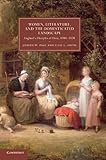WOMEN, LITERATURE, AND THE DOMESTICATED LANDSCAPE : ENGLAND'S DISCIPLES OF FLORA, 1780-1870 / JUDITH W. PAGE, ELISE L. SMITH.
Series: Cambridge studies in nineteenth-century literature and culture ; 76.Publication details: Cambridge : Cambridge University Press, 2011, ò011.Description: xvii, 314 pages : illustrations ; 26 cmISBN:- 9780521768658 (hbk.)
- 0521768659
- English literature -- Women authors -- History and criticism
- English literature -- 19th century -- History and criticism
- Domestic fiction, English -- History and criticism
- Gardens in literature
- Gardening in literature
- Home in literature
- Privacy in literature
- Gardens -- Symbolic aspects -- England -- History
- Women and literature -- England -- History -- 19th century
| Item type | Current library | Home library | Collection | Call number | Materials specified | Copy number | Status | Date due | Barcode | |
|---|---|---|---|---|---|---|---|---|---|---|
| AM | PERPUSTAKAAN TUN SERI LANANG | PERPUSTAKAAN TUN SERI LANANG KOLEKSI AM-P. TUN SERI LANANG (ARAS 5) | - | PR115.P334 (Browse shelf(Opens below)) | 1 | Available | 00002096210 |
Includes bibliographical references (pages 288-307) and index.
Introduction -- PART I. MORAL ORDER: THE SCHOOL OF NATURE: 1.'In the home garden': moral tales for children; 2. The'botanic eye': botany, miniature, and magnification -- PART II. THE VISUAL FRAME: CONSTRUCTING A VIEW: 3. Picturing the'home landscape': the nature of accomplishment; 4. Commanding a view: the Taylor sisters and the construction of domestic space -- PART III. PERSONAL PRACTICE: MAKING GARDENS GROW: 4. Dorothy Wordsworth: gardening, self-fashioning, and the creation of home; 6.'Work in a small compass': gardening manuals for women -- PART IV. NARRATIVE STRATEGIES: PLOTTING THE GARDEN; 7.'Unbought pleasure': gardening in C{uC962}s in Search of a Wife and Mansfield Park; 8. Margaret Oliphant's Chronicles of Carlingford and the meaning of Victorian gardens -- Epilogue.
'Combining an analysis of literature and art, this book contends that the'domesticated landscape' is key to understanding women's complex negotiation of private and public life in a period of revolution and transition. As more women became engaged in horticultural and botanical pursuits, the meaning of gardens - recognized here both as sites of pleasure and labor, and as conceptual and symbolic spaces - became more complex. Women writers and artists often used gardens to educate their readers, to enter into political and cultural debates, and to signal moments of intellectual and spiritual insight. Gardens functioned as a protected vantage point for women, providing them with a new language and authority to negotiate between domestic space and the larger world. Although this more expansive form of domesticity still highlighted the virtues associated with the feminized home, it also promised a wider field of action, re-centering domesticity outward'-- Provided by publisher.
There are no comments on this title.

